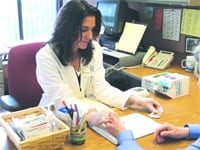Holyoke Medical Center’s Anti-coagulation Clinic Educates as It Medicates
When Dianna Bergeron first began Coumadin treatments, she had to visit a blood-drawing laboratory and then wait for a doctor to call her back with the results.
Nowadays, that’s not the case at Holyoke Medical Center’s Anti-coagulation Service, where she’s greeted monthly with a friendly smile, a quick finger prick, and instant information on how much Coumadin she should take.
“This way, I don’t have to wait for a call from the doctor’s office,” said Bergeron, who receives the blood-thinning medication to combat an irregular heartbeat. “Within five minutes, I know exactly what to do.”
In fact, learning what to do — specifically, how diet, medications, and other lifestyle issues affect how much Coumadin a patient needs — is a crucial component of the treatment. And that emphasis on education helps explain why more than 76{06cf2b9696b159f874511d23dbc893eb1ac83014175ed30550cfff22781411e5} of patients of the HMC clinic are in their correct therapeutic range for the medication, compared to the national average of 50 percent.
“When patients first come in, my first question is, ‘why are you on Coumadin?’” said Christine O’Connor, clinical coordinator of the Anti-Coagulation Service.
“The most common response is, ‘my doctor put me on it,’ and not because they really understand what’s wrong with them,” she continued. “We want to educate them. There are several different conditions that require patients to be on Coumadin, and we discuss their condition with them so they understand it.”
Coumadin, known in generic form as warfarin, is a medication that thins the blood and keeps it from clotting, thereby preventing strokes and other cardiovascular problems, O’Connor explained. About 60{06cf2b9696b159f874511d23dbc893eb1ac83014175ed30550cfff22781411e5} of Coumadin patients at HMC suffer from atrial fibrillation, or irregular heartbeat.
“The problem with atrial fibrillation is that the heart is not beating regularly, so blood can start to pool in the heart, and if it doesn’t get pumped out, it can clot and cause a stroke,” O’Connor said. That’s why it’s so important to keep Coumadin patients in their correct treatment range. To do so, they visit the clinic at least once a month — more often early in their treatment — for a decidedly low-anxiety session.
“It’s always a one-on-one interaction, which is better received, because they’re not intimidated by other patients, who might prevent them from asking questions,” O’Connor said.
After answering a few questions about changes in medication and diet, patients receive a finger stick to draw a drop of blood. This specimen is fed into a device that quickly shows whether the patient is in the correct Coumadin treatment range. That data is then used to produce written instructions on how much of the medication to take daily.
Holyoke Medical Center is a leader not only in keeping patients within their correct range, O’Connor noted, but in avoiding complications. The clinic’s percentage of patients with complications is 1.4{06cf2b9696b159f874511d23dbc893eb1ac83014175ed30550cfff22781411e5}, less than half the national average of 3{06cf2b9696b159f874511d23dbc893eb1ac83014175ed30550cfff22781411e5}. Much of the success rate goes back to that emphasis on education and explaining how certain foods and activities affect the Coumadin level.
“There’s lots of re-education, too,” O’Connor said. “On follow-up visits, we review certain bits of information.”
“I’m still learning,” Bergeron added. “They give you a better hold on what you should be doing. Otherwise, you might take too much and your blood would be too thin, or your blood would get too thick from eating too many greens. They get you on track.”
Averaging 46 visitors a day — all referred by physicians — the clinic has treated 1,025 people in all since it opened four years ago, and “it’s growing by leaps and bounds,” O’Connor said. She added that patients enjoy the privacy offered by the recently expanded space, in which the one-on-one chats and tests are conducted out of sight of other patients.
“It’s much more private and confidential,” she said. “Patients really like it a lot better.”
For more information on Holyoke Medical Center’s Anti-coagulation Service, call O’Connor at (413) 534-2834.



Comments are closed.